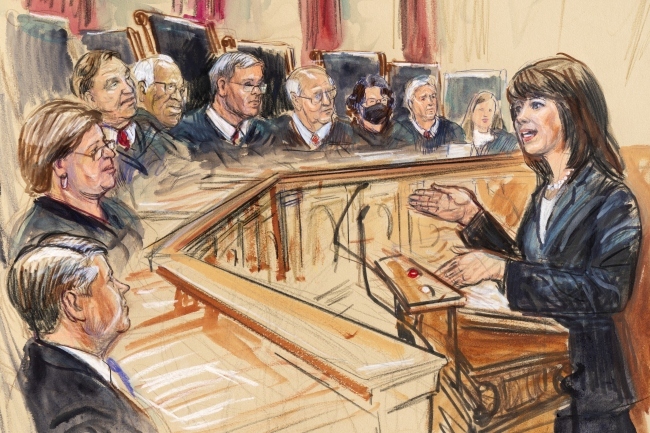Supreme Court questions controversial Texas abortion law
A majority of the Supreme Court signaled Monday they would allow abortion providers to pursue a court challenge to the controversial Texas law that has virtually ended abortion in the nation’s second-largest state after six weeks of pregnancy.

This artist sketch depicts Solicitor General Elizabeth Prelogar, right, presenting an argument before the Supreme Court, Monday, Nov. 1, 2021, in Washington. [Photo: Dana Verkouteren via AP]
But it was unclear how quickly the court would rule and whether it would issue an order blocking the law that has been in effect for two months, or require providers to ask a lower court to put the law on hold.
Justices Brett Kavanaugh and Amy Coney Barrett, two conservative appointees of former President Donald Trump, voted in September to allow the law to take effect, but they raised questions Monday about its novel structure. The law, written to make it difficult to mount legal challenges, subjects clinics, doctors and any others who facilitate abortions to large financial penalties.
“Millions and millions retroactively imposed, even though the activity was perfectly lawful under all court orders and precedent at the time it was undertaken, right?" Kavanaugh asked, one of several skeptical questions he put to Judd E. Stone II, representing Texas.
Barrett, too, pressed Stone about provisions of the law that force providers to fight lawsuits one by one and, she said, don't allow their constitutional rights to be “fully aired.”
The justices heard three hours of arguments Monday in two cases over whether abortion providers or the Justice Department can mount federal court challenges to the law, which has an unusual enforcement scheme its defenders argue shields it from federal court review.
The Biden administration filed its lawsuit after the justices voted 5-4 to refuse a request by providers to keep the law on hold. Justice Neil Gorsuch, also a Trump appointee, and two other conservative justices joined Barrett and Kavanaugh in the majority to let the law take effect. Chief Justice John Roberts joined the court’s three liberal justices in dissent.
The justices sounded less convinced that the Justice Department lawsuit should go forward, and Justice Elena Kagan suggested that a ruling instead in favor of the providers would allow the court to avoid difficult issues of federal power.
In neither case argued Monday is the right to an abortion directly at issue. But the motivation for the lawsuits is that the Texas law conflicts with landmark Supreme Court rulings that prevent a state from banning abortion early in pregnancy.
Arguing for the United States, Solicitor General Elizabeth Prelogar told the justices that Texas’ law was enacted in “open defiance” of Supreme Court precedent. “It enacted a law that clearly violates this court’s precedents,” she said.
Under the Supreme Court's 1973 Roe v. Wade decision and 1992 Planned Parenthood v. Casey decision, states are prevented from banning abortion before viability, the point at which a fetus can survive outside the womb, around 24 weeks of pregnancy.
The justices will hear a separate challenge to those decisions in a case over Mississippi's ban on abortion after 15 weeks. Those arguments are set for Dec. 1.
The most direct reference to the Mississippi case came from Justice Samuel Alito, who asked if the decision by providers to stop doing abortions in Texas “is attributable to the fear of liability if Roe or Casey is altered?”
But most questions focused on the Texas law and how it has altered abortion in the state even before the high court has made any change in abortion law. Kagan told Stone that until Texas passed its law, "no state dreamed" of trying to make an end-run around Supreme Court precedent in the same way.